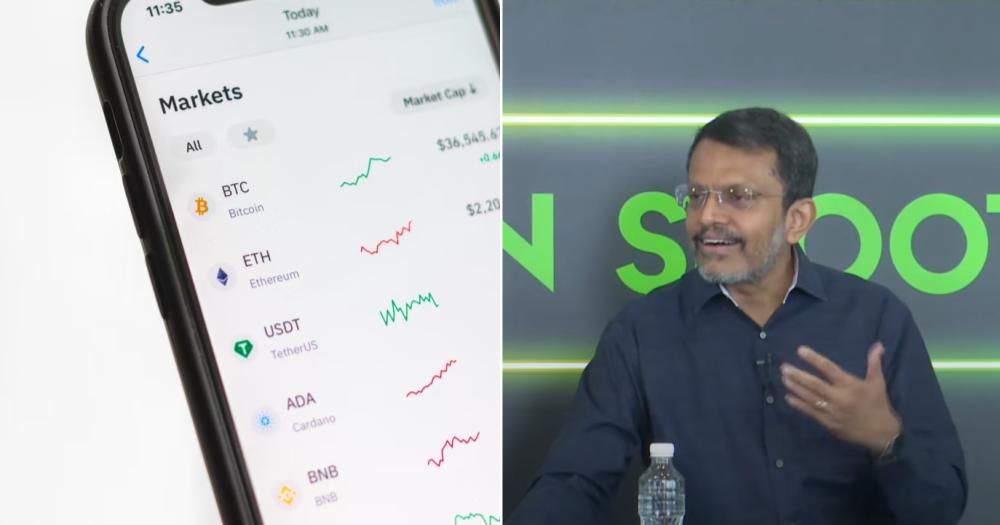Follow us on Telegram for the latest updates: https://t.me/mothershipsg
The regulator of Singapore's financial institutions, the Monetary Authority of Singapore (MAS), has noted a "global phenomenon" of retail investors trading in cryptocurrencies despite various warnings and measures.
MAS is therefore considering "further measures" to reduce the harm that can be done to consumers, who seem to be "irrationally oblivious about the risks of cryptocurrency trading", said Ravi Menon, Managing Director of MAS, in a speech at an event on Aug. 29, 2022.
This comes after MAS imposed restrictions on digital asset players in January 2022, prohibiting them from promoting cryptocurrency services in public places.
Following these restrictions, Bitcoin ATMs and cryptocurrency trading advertisements in MRT stations were removed.
What further measures could be imposed?
Menon said the further measures MAS is considering are aimed at "adding frictions on retail access to cryptocurrencies".
He cited "customer suitability tests" as one example of further measures.
Another possible new measure would be to restrict leverage and credit facilities for cryptocurrency trading.
Using leverage in cryptocurrency trading involves investors taking loans to purchase larger amounts of cryptocurrency, magnifying the potential gains if one's investment decisions were to prove successful.
However, leverage can also increase an investor's losses.
Why not ban retail investors from cryptocurrency trading?
Menon acknowledged, however, that it would probably not be feasible to completely ban retail investors from accessing cryptocurrencies.
This is due to the "borderless" nature of the cryptocurrency world and the ease of access to crypto exchanges, which allow people to buy or sell cryptocurrencies with "just a mobile phone", he said.
Menon also said MAS regulation alone would not be sufficient in "safeguarding consumers from harm" and pointed to the importance of global cooperation to minimise regulatory arbitrage — a situation where industry players are effectively able to sidestep regulations in one country or territory by capitalising on less-stringent rules elsewhere.
Along with regulators, the industry has "an important role" in protecting consumer interests by creating "sensible measures" to minimise harm, while individual consumers should also "take responsibility and exercise judgement and caution," Menon said.
"No amount of MAS regulation, global co-operation, or industry safeguards will protect consumers from losses if their cryptocurrency holdings lose value," he added.
The elephant in the room
Menon spoke at a seminar titled "Yes to digital asset innovation, No to cryptocurrency speculation!"
He opened his speech by acknowledging what he called " the elephant in the room", namely, that "MAS seems to be sending mixed signals when it comes to crypto and digital assets."
While MAS is promoting Singapore as a FinTech hub and wants to attract leading crypto players to Singapore, it also has a "stringent and lengthy licensing process" for those seeking to provide crypto services and has been making moves to restrict retail access to cryptocurrency.
Menon noted this has led to "expressions of confusion and concern by some observers."
He thus proceeded to explain "what MAS is actively promoting; what MAS is discouraging; and what are the risks MAS is seeking to manage."
"My apologies if the next couple of minutes sound like a tutorial but it is important that we are clear about the concepts we are dealing with," said Menon.
Speculation in cryptocurrencies singled out
Menon explained that it was speculation in cryptocurrencies that MAS wanted to discourage and restrict, even while seeking to promote a digital asset ecosystem.
"Cryptocurrencies are actively traded and heavily speculated upon, with prices that have nothing to do with any underlying economic value related to their use," he said, adding that "the extreme price volatility of cryptocurrencies rules them out as a viable form of money or investment asset."
Top image via Behnam Norouzi on Unsplash and MAS on YouTube
If you like what you read, follow us on Facebook, Instagram, Twitter and Telegram to get the latest updates.
